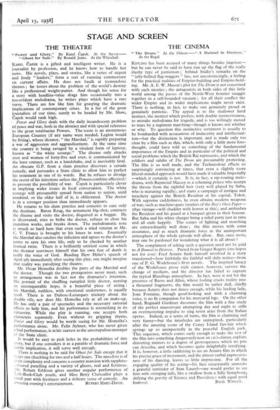STAGE AND SCREEN
THE THEATRE
KAREL tAPEIC is a gifted and intelligent writer. He is a journalist by profession, and he knows how to handle hot news. His novels, plays, and stories, like a series of urgent and lively " leaders," form a sort of running commentary on current affairs. He does not baulk at tremendous themes ; he tosses about the problem of the world's destiny like a professional weight-putter. And though his sense for a story with headline-value drags him occasionally into a too-evident melodrama, he writes plays which have a rare verve. There are few like him for grasping the dramatic implications of contemporary crises. In a list of the great journalists of our time, surely to be headed by Mr. Shaw, Capek would rank high.
Power and Glory deals with the daily incandescent problem of peace and war, both in the abstract and with special reference to the great totalitarian Powers. The scene is an anonymous European Country (if any name were needed, Legion would be fitting), whose dictator, " the Marshal," is rapidly preparing a war of aggression and aggrandisement. At the same time the country is being ravaged by a virulent form of leprosy, known as " the white scourge." The disease only attacks men and women of forty-five and over, is communicated by the least contact, such as a handshake, and is inevitably fatal. An obscure G.P. from a slum practice discovers a certain remedy, and persuades a State clinic to allow him to perfect his treatment in one of its wards. But he refuses to divulge the secret of his injections unless the Powers combine effectivetr to prevent the possibility of war. Capek is particularly clever at implying wider issues in local conversation. The white scourge will presumably spread from nation to nation, until mankind, or the older half of it, is obliterated. The doctor is in a stronger position than immediately appears.
He returns to his -slum practice and consents to cure only the destitute. Baron Krug, the armament big-shot, contracts the disease and visits the doctor, disguised as a beggar. He is discovered, tries to bribe the doctor, refuses to close his munition works, and breaks down. The melodramatic note is struck so hard here that even such a tried veteran as Mr. C. V. France is brought to his knees in tears. Eventually the Marshal also catches the infection and agrees to the doctor's terms to save his own life, only to be checked by another ironical twist. There is a brilliantly satirical scene in which the dictator convinces himself that his own fear of death is really the voice of God. Reading Herr Hitler's speech of April 9th immediately after seeing this play, one might imagine that reality was parodying the theatre.
Mr. Oscar Homolka doubles the parts of the Marshal and the doctor. :Though the two protagonists never meet, such an arrangement was in fact not the dramatist's intention. His portrait of the shuffling rumpled little doctor, nursing an unconquerable hope, is a beautiful piece of acting : his Marshal, ruthless, with emotional undertones, is equally good. There is no Dubosc-Lesurques trickery about the double role, nor does Mr. Homolka rely at all on make-up. He has only a pair of spectacles and the necessary sartorial effects to help him, and his performance is astonishing in its virtuosity. While the play is running, one accepts both characters separately. Even without its gripping theme, Power and Glory would be worth seeing for Mr. Homolka's performance alone. Mr. Felix Aylmer, who has never given a bad performance, is at his suavest as the unscrupulous manager of the State clinic.
It would be easy to pick holes in the probabilities of this story, but if one considers it as a parable of dramatic force and subtle implication, it will serve well enough.
There is nothing to be said for Ghost for Sale except that it keeps one chuckling for two and a half hours. The anecdote is of great complexity and concerns a country mansion with sapphire- Loloured panelling and a variety of ghosts, real and fictitious. Mr. Robert Eddison gives another angular performance of Left-Book-Club youth, and Miss Betty Chancellor plays a small part with freshness and a delicate sense of comedy. An amusing evening's entertainment. RUPERT HART-DAVIS.






































 Previous page
Previous page